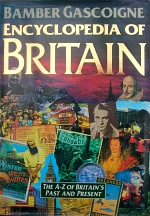| |

More than 5000 entries on the history, culture and life of Britain (published in 1993 by Macmillan, now out of print)
|
Elizabeth I
|
|
|
(1533–1603)
Queen of England and Ireland from 1558; second daughter of Henry VIII, her mother being *Anne Boleyn.
Arguably England's greatest monarch, she only came to the throne because of the deaths of her younger brother *Edward VI and her elder sister *Mary I. She inherited a country torn between the Puritans who had prospered under Edward and the Roman Catholics who had benefited under Mary. It was typical of Elizabeth's attitude and qualities that she contrived to establish a moderate *Church of England, reasserting authority without the previous extremes of persecution.
|
|
|
|
|
Religion dominated foreign as well as home affairs, with other rulers and their factions constantly trying to restore a Roman Catholic to the English throne. This was the thorn in Elizabeth's long and difficult relationship with her cousin *Mary Queen of Scots, and it was the underlying cause of the greatest external threat, the *Armada. The queen had a genius for keeping the affection and loyalty of the talented administrators, soldiers and sailors who were also her courtiers. Some, such as the earl of *Leicester, were her wooers as well, and she astonished her contemporaries by remaining resolutely the Virgin Queen. But a royal husband from abroad (she turned down *Philip II of Spain) or a loyal English subject would each, in different ways, have cramped her freedom to rule.
|
|
|
|
|
Elizabeth presided over a period during which England was stabilized after a long period of upheaval. There were the beginnings of expansion abroad, in the journeys of *Raleigh and others. And her last decade saw the birth of England's great theatrical tradition, with *Marlowe and *Shakespeare.
|
|
|
|
|
Her greatest talent was her ability to inspire and unite her people, almost at times flirting with their affections. Few monarchs have spoken in such plain and emotional terms, whether in her speech to rally the troops at Tilbury in 1588 (where she described herself as having the *'body of a weak and feeble woman' but the 'heart and stomach of a king') or in the mood of farewell which formed part of her so-called 'golden speech' to members of the House of Commons in 1601:
|
|
|
|
|
'This I account the glory of my crown, that I have reigned with your loves... And though you have had, and may have, many mightier and wiser princes sitting in this seat, yet you never had, nor shall have any that will love you better.' It hardly seems to matter that the occasion was a royal demand for more taxes.
She was succeeded by her Scottish cousin, *James I and VI (see the *royal house).
|
|
|
|